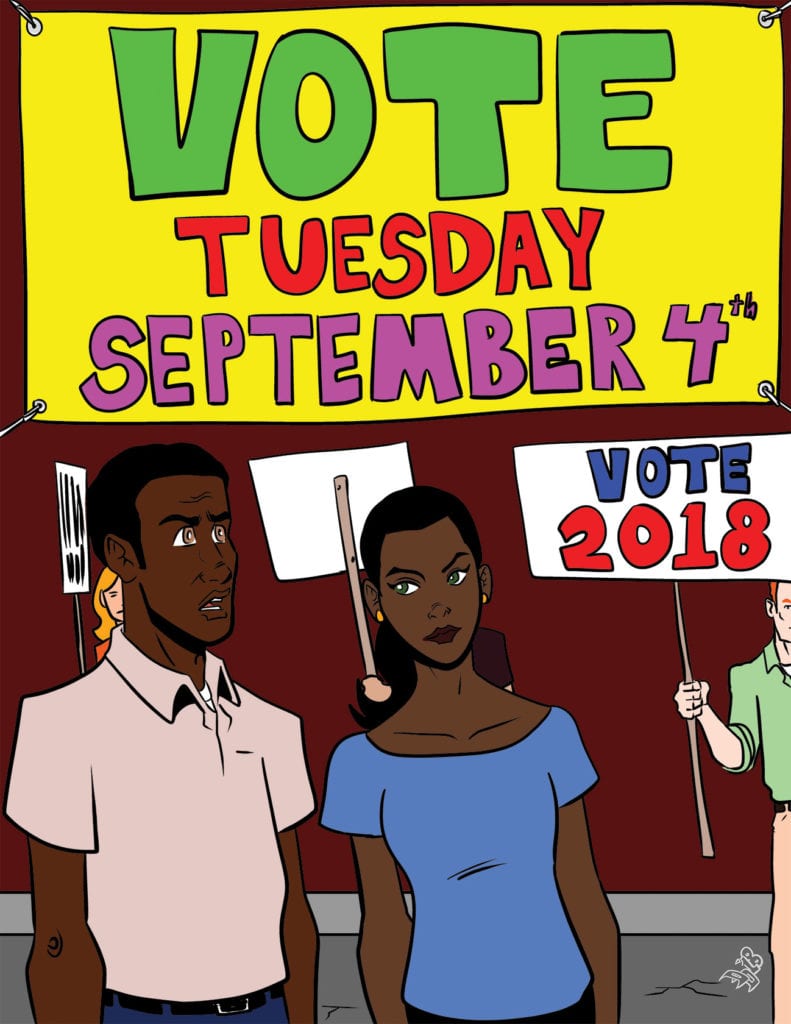
The oft-repeated message about the importance of the black vote seems to be finally taking hold. Analysis of the past two elections for president indicates that blacks vote in presidential elections at a rate equivalent to whites. However, in off-year elections and in primaries, the vote by blacks often declines. There is some trepidation among some prominent blacks about the turnout on Tuesday, Sept. 4.
When there is vigorous campaigning, such as in the recent special election in Alabama for U.S. Senate, blacks will turn out in large numbers. Doug Jones, a Democrat, beat Roy Moore in the race to replace Jeff Sessions who had resigned to become U.S. attorney general. An estimated 96 percent of blacks voted for Doug Jones, who was able to get only 30 percent of the white votes. The Jones victory depended upon a solid black Democratic vote in the historically Republican state.
For Democrats, there is no opposition in the primary race for the incumbent U.S. Senator Elizabeth Warren. In the race for governor, Jay Gonzalez and Bob Massie are competing for the right to confront the Republican incumbent Charlie Baker.
Most other constitutional officers are unopposed: Attorney General Maura Healey, Treasurer Deborah Goldberg and Auditor Suzanne Bump. However, Secretary of State William F. Galvin is opposed by City Councilor Josh Zakim, and Governor’s Councilor Christopher A. Iannella Jr. is opposed by Mark Rooney.
One of the contests that attracts the attention of black voters is the battle for Suffolk County district attorney. After serving for several terms, Daniel F. Conley has decided not to run for reelection. With an empty seat, five contestants have emerged. Three of them are black: Evandro Carvalho, Linda Champion and Rachael Rollins. The other contestants are Gregory Henning and Shannon McAuliffe.
Those voters who place greatest emphasis on electing a black district attorney will undoubtedly split their votes among three black candidates, and those who want a woman in that office will also have three to choose from. Such preferences seem to help Henning’s chances.
Another contest with racial overtones is for U.S. representative for the 7th District. Some political commentators have mistakenly drawn an analogy between the victory of Alexandria Ocasio-Cortez over Joseph Crowley in the Bronx. By contrast, Mike Capuano has remained close to his constituents over the years and has been recognized for his hard work and achievements.
Jon Santiago is challenging Byron Rushing for 9th Suffolk representative (South End), Liz Miranda is a leading candidate among four vying to replace Evandro Carvalho in the 5th Suffolk (Dorchester) and Nika Elugardo is challenging Jeffrey Sanchez in the 15th Suffolk (Mission Hill).
The bottom line is to get to the polls. In an election similar to the pending one, only 16.7 percent of the citizens went out to vote. Ward 12 in Roxbury was precisely average with a 16.41 percent turnout. But West Roxbury was 26.4 percent and Jamaica Plain was 24.29 percent.
Politics is essentially a numbers game. The one with the greatest number of votes wins. The strategy must be to have the winning number.






